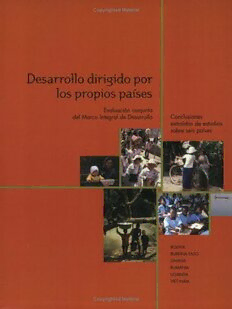
Desarrollo dirigido por los propios países: evaluación conjunta del marco integral de desarrollo : conclusiones extraídas de estudios sobre seis países PDF
116 Pages·2004·1.809 MB·Spanish
Most books are stored in the elastic cloud where traffic is expensive. For this reason, we have a limit on daily download.
Preview Desarrollo dirigido por los propios países: evaluación conjunta del marco integral de desarrollo : conclusiones extraídas de estudios sobre seis países
Description:
The Comprehensive Development Framework (CDF) - launched by World Bank President James D. Wolfensohn in early 1999 - has become an important influence on the global development agenda. The CDF consists of four principles: a long-term, holistic development framework; results orientation; country ownership; and country led-partnership. These core principles are not new individually, but bringing them together as a unified concept and championing the package within the global development community has been an important innovation. This evaluation, conducted by multi-disciplinary teams with members from developed and developing countries, shows that both donors and recipients have made progress in implementing the CDF principles, particularly in countries where one or more of the principles have been applied over a number of years. However, these positive changes are fragile and could be stalled or reversed. Implementing the principles requires changes in entrenched behaviors and institutional practices. Thus, dedicated and consistent attention is needed by top donor leadership and recipient countries to ensure that momentum is sustained. The in-depth case studies focus on Bolivia, Ghana, Romania, Uganda and Vietnam - all CDF pilot countries at the time - and Burkina Faso (a non-CDF pilot). This title also includes a CD-ROM.
See more
The list of books you might like
Most books are stored in the elastic cloud where traffic is expensive. For this reason, we have a limit on daily download.
